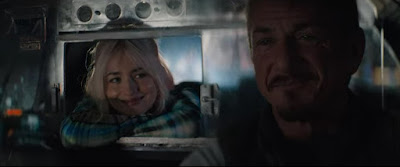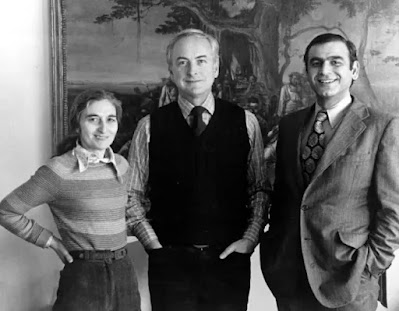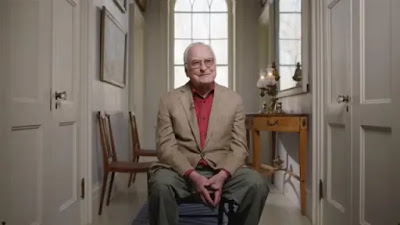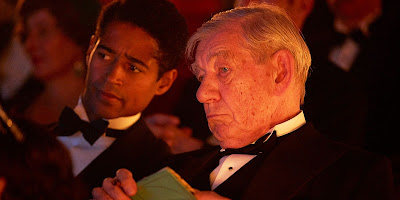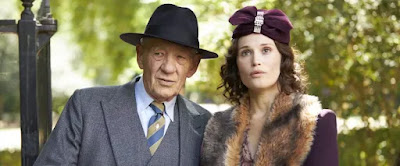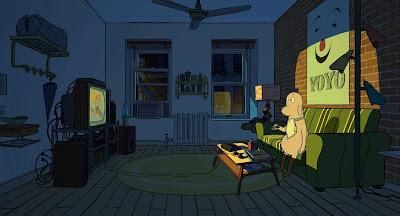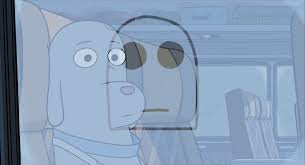I Am Alfred Hitchcock (John Ashton McCarthy, 2021) A career overview, the type you're likely to see if someone has no real access to the subject and merely a large collection of clips to cull from. Think of it as an "Entertainment Tonight" career overview...with a little bit of speculation about what made Hitch "tick." But, not much.
And it's extensive: from home movies to his interviews—both filmed and merely audio as well as with some confederates, old and new—starting from Hitchcock's childhood, including (invaluably) his time in early British silents and German studios. And a lot of unseen talking heads. A couple of snatches of past Spielberg interviews are included, but most of the comments are from Eli Roth (for some reason), William Friedkin, Edgar Wright, and John Landis. Ben Mankiewicz weighs in. Much mention is made of Joan Harrison (as it probably should be, given the work she did for him in his American transition and on his television shows) and there is a lot of nice footage from the AFI salute to the man, including his extensive tribute to his secret weapon, wife Alma Reville. There are nice touches throughout, and it's quite entertainingly put together. But, as an exploration of the man, his movies, and how they all relate, it's pretty basic stuff.
My Name is Alfred Hitchcock (Mark Cousins, 2023) The iconoclastic Irish documentarian (he made The Story of Film: An Odyssey and The Eyes of Orson Welles) makes his look at Hitchcock (for his first film's 100th anniversary) with a conceit that he's used in some of his lesser-known films, as a conversation between the filmmaker and the director-subject (voiced by Alistair McGowan and quite convincingly). Oh, some of the things that McGowan-Hitchcock says in the film are a matter of record, but Cousins uses this conversational version of "Alfred Hitchcock Explains It All To You" to build on themes that might have gotten lost in the chases and cameos, the Blondes and the wrong men and the usual accoutrements of a Hitchcock film—"the core of things" (as the faux-Hitchcock states). These are Cousins' personal thoughts and observances being seduced and manipulated by Hitchcock, who used the mechanics of cinema, the psychology of photography, and his own neuroses to dredge up our fears, raise our blood-pressures, and ponder our natures (while pandering to them, as well).And so, though they're Cousins' observations through the voice of Hitchcock, one could hardly help thinking that Hitchcock is being misinterpreted ("You do know that movies are lies, don't you?" says the faux-Hitchcock at one point) as he was one of the most obvious of directors—what he intended he put on the screen. It's just that nobody had done things quite like that before, made movies like that before, thought thoughts like that and confessed them so nakedly like that before.
Cousins is generous with clips as he focuses on six themes that thematically run through the director's films: Escape, Desire, Loneliness, Time, Fulfillment, and Height. Just reading that list, one can tick off random instances from Hitchcock films that will prove the point, but that they run consistently through his work, even fleetingly more than proves Cousins' point.
At the same time, Cousins' Hitchcock has a marketer's point of view on making films. This version emphasizes "stars and glamour" as the motivator for attracting audiences, as they already have a sympathetic, empathetic view of the actors, doing a lot of the leg-work to get them on "their side." To the point where Cousins' Hitchcock avatar never mentions character's names in his movies, only the thespians. "When Cary Grant" does this or "when Grace Kelly does that."
Double Take (Johan Grimonprez, 2009)
"You think all the way through that cinema is going to be killed by
television or television is going to kill cinema or America is going to
kill Russia or Russia is going to kill America. But at the end, it’s the
third one, the new one, the younger one, the YouTube version, that
comes along and kills them all."
The wildest of the Hitchcock documentaries, Double Take is a "found-footage" documentary using even the very grain of the image to tell the story. Based on a Jose Luis Borges short story, "August 25, 1983" and expanded from Grimonperez's* earlier short Looking for Alfred, it is a long story, narrated by another Hitchcock sound-alike, Mark Perry, of an encounter a fictitious Hitchcock has in 1963 with himself from 1980. It's a shaggy-dog story, recreated with a Hitchcock lookalike, and a lot of editing between Hitchcock footage...from "Alfred Hitchcock Presents" and other sources, interspersed with news coverage of geo-political events and Instant Folgers commercials (which turn bad coffee into domestic drama). It's a bit of a satire about the new replacing the old, but not changing much for the transition. It doesn't precisely nail its thesis, events being difficult to bend to one's advantage. But, there are moments of wit and some lost opportunities.
It's true to a certain extent, even considering there is some cherry-picking going on. But, if one is looking for "the" first "Hitchcock" film, Blackmail is the most likely suspect (the only reason it doesn't loom larger in peoples' memories is it was in his British period, on the cusp of the sound era, and—being in the public domain—it seems less valued as a marketable property than his other films (which is a bit ironic).
But, some elements that are discussed—the tropes—are in his earlier films, because what made Hitchcock Hitchcock were his obsessions and his neuroses, which were there in little sparks at the beginning with even his first film, his vulnerabilities only growing full-flower when he had more confidence in the control of his films (how's that for irony?).
But, sure, say it was Blackmail because of the chase through the British Museum (all done in studio, by the way). But, the film is also notable for being the director's first sound film—he did another version for silent cinemas that were not speaker-wired-up while making this one, sometimes shooting alternate footage for scenes where title cards needed to do the talking. There are, frankly, radical transitions using only sound, showing how freakishly ingenious Hitchcock could be playing with new toys.
And how's this for radical? Hitchcock's "blonde" for this one was a Czech actress named Anny Ondra whose English was so heavily-accented that she was directed to just mouth the words while actress Joan Barry performed the vocal part out of sight of the camera. The illusion is almost flawless, noticeable only if you're looking (and listening for it). You come away from Bouzereau's film maybe not so assured that Blackmail set the template for what was "Hitchcockian" in the future, but certainly convinces that the man was a genius for figuring out ways for telling stories pictorially, psychologically...but also sonically.
But, then...we already knew that.* Grimonperez was nominated for the "Best Documentary Feature" Oscar last year for his documentary Soundtrack to a Coup d'Etat

poster.jpg)
_poster.jpg)



















